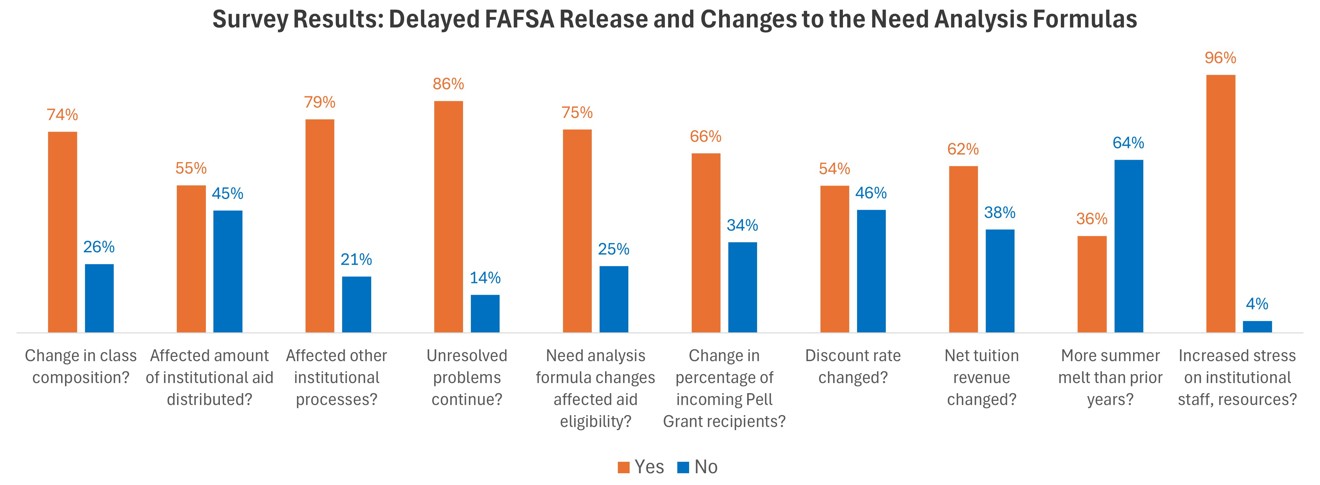Member Survey on FAFSA Delay Reveals Broad, Substantial Impact
Three out of 4 private, nonprofit colleges and universities reported issues related to FAFSA availability and processing changed the composition of their incoming class in a survey conducted by NAICU. In addition, half reported their incoming class was more difficult to fill and 43 percent reported a smaller incoming class.
NAICU surveyed its member colleges and universities in July to better understand the effects of both the FAFSA delay and the changes made to the need analysis formulas used to determine student aid eligibility. More than 400 institutions responded, with many providing detailed narratives. NAICU plans to reissue the survey in September to compare the situation before and after the start of the academic year.
The changes to FAFSA had a broad and substantial impact on private, nonprofit colleges that continues today, as seen in the following results:
- Four out of 5 institutions responded that issues related to FAFSA availability and processing affected other institutional processes. Most responded that at least one other institutional process was postponed, and many schools noted a cascading effect.
- Almost all institutions (5 in 6) continue to feel the impact of the FAFSA delay, citing persistent problems with corrections and newly seen problems that remain unresolved.
- Three out of 4 institutions reported that changes to the need analysis formulas affected aid eligibility on their campus. Specifically, 65 percent of schools said aid eligibility was impacted by a change in the factor that considers the number of family members in college, while 48 percent cited the expansion of Pell Grant income levels.
- Ninety-six percent of institutions reported increased levels of stress on institutional staff and/or resources. Most schools mentioned overworked staff worried about additional reporting requirements. Some institutions reported resignations.
The processing delays had a significant impact on the admissions process with students changing their enrollment decisions.
"By the time the FAFSAs were provided to schools, the number of students that had decided to attend elsewhere or not attend college was huge…They couldn't make informed decisions on the viability of attending our school,” said one respondent.
The delays stressed the pre-enrollment process on many campuses, with one respondent writing: “Delays on FAFSA pushed all aspects of pre-enrollment of first-time students back significantly (housing, registration, advising, etc.) and significantly increased the amount of added staff work in both financial aid and student accounts offices, which made other essential college work they typically do this time of year also delayed."
The lack of accurate data had a significant impact on the ability of institutions to offer aid to the most disadvantaged students.
"Corrections for schools just became available and there are many that schools need to complete before they can process aid for students. Some verification tasks are not available yet, which may put the most disadvantaged students at risk of not receiving aid,” said one respondent.
Finally, the stress on campus staff in financial aid, accounts and other back-office services is still being felt.
"The normal work of reviewing and awarding aid has had to be done at least twice for each student. This workload was not reduced by the offer of federally funded staff support. Additionally, data changes and the continuing lack of accuracy in releases have resulted in additional work and stress. There is also stress because of being on the front line of a national crisis, and at times being blamed for that crisis. The increased stress on our staff, and increased resources expended have all been in support of students,” noted one school.

Other survey results, highlighted in the chart above, indicate that half of responding colleges experienced a change in the amount of institutional aid they distributed, and 2 out of 3 colleges experienced a change in the percentage of Pell Grant recipients in their incoming class.
NAICU continues to analyze the effects of the FAFSA delay and the changes made to the need analysis formulas and is in regular contact with the Department of Education regarding the FAFSA.
For more information, please contact:
Jason Ramirez

